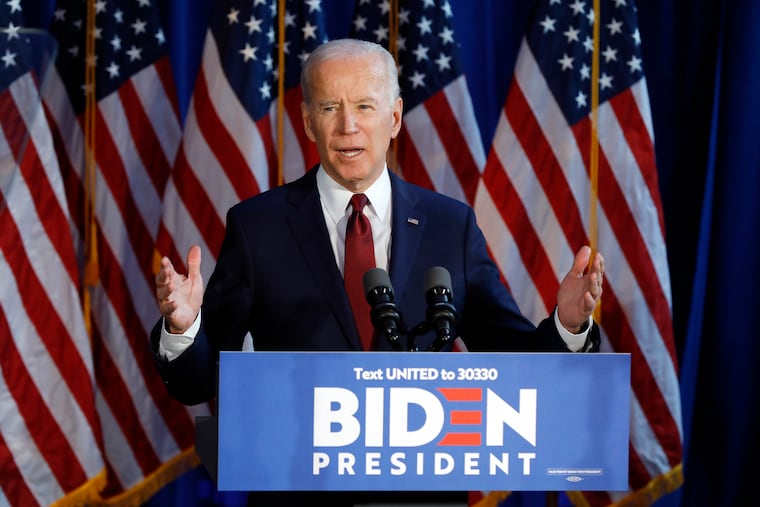Joe Biden is flexing his foreign-policy muscles amid the Iran conflict. But rivals point to his Iraq War vote.
The high-stakes conflict with Iran has give Joe Biden an opening to emphasize his experience on the world stage and promise to be a steady hand, while his rivals say it's a reminder of his vote in favor of the ill-fated Iraq War.

When Joe Biden’s bus tour rolled through Iowa last month in a critical campaign swing, he put his promise of steady world leadership at the forefront.
Biden brought out former Secretary of State John Kerry to vouch for his global standing, and emphasize the importance of experience and know-how as a vital corrective to President Donald Trump’s impulsive style. He rolled out a television ad showing foreign leaders mocking Trump, and said world leaders already know and respect him.
Now, the high-stakes conflict with Iran has thrust international affairs and America’s world standing to the top of the national debate, giving Biden an opening to emphasize one of his core arguments just weeks before Iowa holds the first contest in the race for the Democratic nomination.
At the same time, however, the Middle East clash has handed his rivals the chance to undercut Biden on the same issue. And they have run with it, pointing out that despite all of Biden’s vaunted experience, he supported the Iraq War that has left America in an intractable fight, and the region as volatile as ever.
The clashes have played out in somber speeches and pointed critiques — and even after tensions eased Wednesday, foreign policy now seems certain to play a major role in next week’s Democratic presidential debate, the last national event scheduled before Iowa’s caucuses on Feb. 3.
Biden delivered an address in New York on Tuesday, which presented the former vice president and Senate Foreign Relations Committee chairman with all the trappings of national leadership — including a backdrop of American flags against a deep-blue background.
Speaking from twin teleprompters and with a grave tone, Biden blasted Trump for “haphazard decision-making” and a “reckless disregard for the consequences" of the attack killing Iranian military commander Qasem Soleimani. Noting his 40-plus years in the White House and Senate, he said he aimed to restore sorely missing “presidential gravitas.”
The argument that he would steady the wheel internationally matches his overall campaign pitch that he stands apart as a safe, tested, and proven antidote to Trump.
Biden’s rivals seem just as happy to talk about his foreign-policy record, particularly Iraq.
“Joe Biden voted and helped lead the effort for the war in Iraq, the most dangerous foreign-policy blunder in the modern history of this country,” Sen. Bernie Sanders of Vermont said this week on CNN.
It’s an argument Sanders has long made, but one given added relevance as the country is pulled toward another Middle East crisis. Sanders, who opposed the Iraq War, led a group of lawmakers in introducing a bill Thursday to block funding for war against Iran without congressional approval.
“The [Iraq] war was a mistake and I think it was a mistake for anyone to vote for that war,” Sen. Elizabeth Warren (D., Mass.) said on MSNBC this week. Asked specifically whether she meant Biden, she replied: “Everyone.”
Former Mayor Pete Buttigieg of South Bend, Ind., an ex-Navy intelligence officer who served in Afghanistan, previously blasted Biden for supporting “the worst foreign-policy decision made by the United States in my lifetime." This week, he said that “when you run for office, your record is fair game and your judgment on important issues can be derived based on your record.”
Buttigieg has touted his military service and firsthand view of conflict as an asset that distinguishes him from the crowded field.
Biden allies say they’re happy to have that fight, and see the focus on foreign policy, an afterthought for much of the Democratic primary, as a boon just before Iowans begin voting. They believe voters will be more focused on Biden’s eight recent years as vice president than his 2002 vote authorizing the war, for which he later expressed regret.
A CNN poll in late November found that 48% of Democratic voters rated Biden as the candidate best suited to handle foreign policy. Sanders was second, at 14%. It was by far the largest lead for any candidate on any of the six issues CNN polled.
"To the extent that foreign policy is at the front of the agenda, and there’s no question that Iran has put it there, this is helpful to Biden, because Biden has more experience than all the rest of the candidates combined on foreign policy,” said Derek Chollet, executive vice president at the German Marshall Fund. Chollet, who worked in high-level defense roles in the Obama administration and is a visiting fellow at the University of Pennsylvania’s Perry World House, is neutral in the Democratic race.
He argued that foreign policy had been pushed unusually far into the background in the 2020 primary campaign compared with past races — until the last week.
Yet Lara Brown, a political science professor at George Washington University, said the debate shows another contrast between the idealized version of Biden and the reality of his results.
“He seems strongest when he is a theory, not a fact," Brown said. While his experience sounds reassuring, she said, the Iraq War vote is a major liability. “The fact of his legislative record is problematic in today’s world.”
Brown also said Buttigieg, despite his military experience, could be hurt by the recent developments. Voters might have second thoughts about putting a 37-year-old in the Oval Office after this reminder of the drastic responsibilities the president holds, she said.
At the very least, Brown said, the question is sure to play a newly prominent role as Democrats speed toward a crucial contest in Iowa.